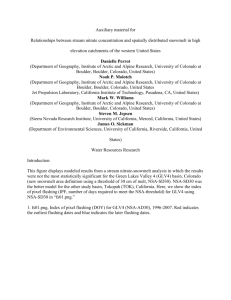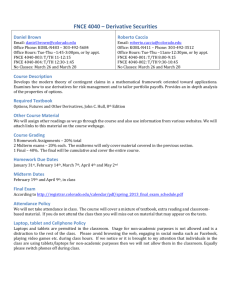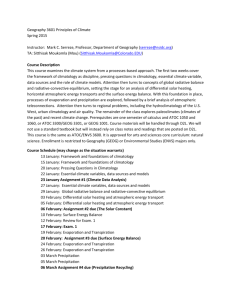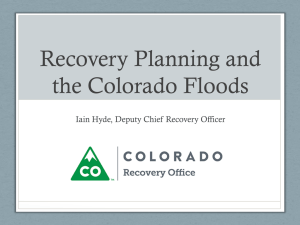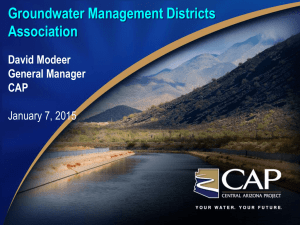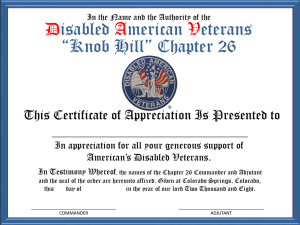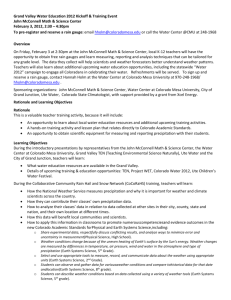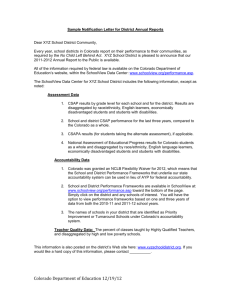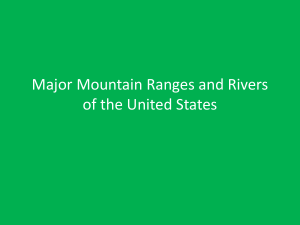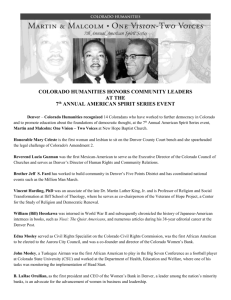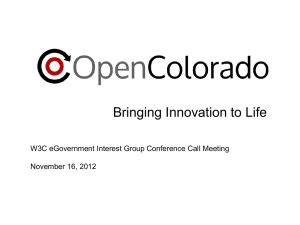Instructor Contact Information - Department of Political Science
advertisement
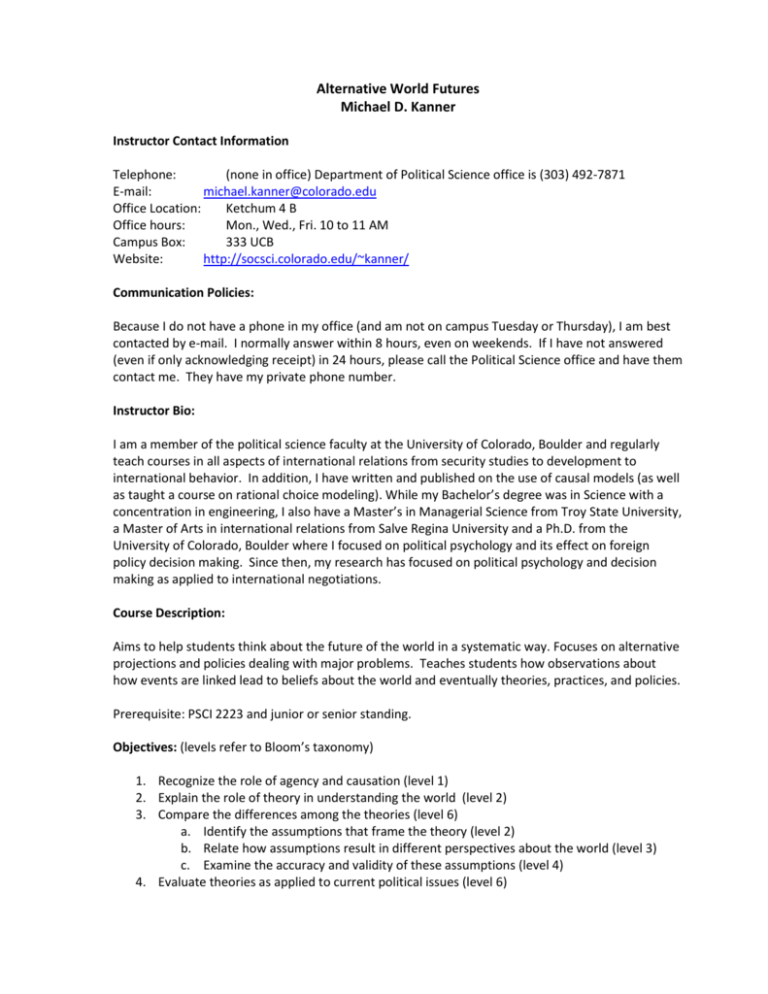
Alternative World Futures Michael D. Kanner Instructor Contact Information Telephone: (none in office) Department of Political Science office is (303) 492-7871 E-mail: michael.kanner@colorado.edu Office Location: Ketchum 4 B Office hours: Mon., Wed., Fri. 10 to 11 AM Campus Box: 333 UCB Website: http://socsci.colorado.edu/~kanner/ Communication Policies: Because I do not have a phone in my office (and am not on campus Tuesday or Thursday), I am best contacted by e-mail. I normally answer within 8 hours, even on weekends. If I have not answered (even if only acknowledging receipt) in 24 hours, please call the Political Science office and have them contact me. They have my private phone number. Instructor Bio: I am a member of the political science faculty at the University of Colorado, Boulder and regularly teach courses in all aspects of international relations from security studies to development to international behavior. In addition, I have written and published on the use of causal models (as well as taught a course on rational choice modeling). While my Bachelor’s degree was in Science with a concentration in engineering, I also have a Master’s in Managerial Science from Troy State University, a Master of Arts in international relations from Salve Regina University and a Ph.D. from the University of Colorado, Boulder where I focused on political psychology and its effect on foreign policy decision making. Since then, my research has focused on political psychology and decision making as applied to international negotiations. Course Description: Aims to help students think about the future of the world in a systematic way. Focuses on alternative projections and policies dealing with major problems. Teaches students how observations about how events are linked lead to beliefs about the world and eventually theories, practices, and policies. Prerequisite: PSCI 2223 and junior or senior standing. Objectives: (levels refer to Bloom’s taxonomy) 1. Recognize the role of agency and causation (level 1) 2. Explain the role of theory in understanding the world (level 2) 3. Compare the differences among the theories (level 6) a. Identify the assumptions that frame the theory (level 2) b. Relate how assumptions result in different perspectives about the world (level 3) c. Examine the accuracy and validity of these assumptions (level 4) 4. Evaluate theories as applied to current political issues (level 6) Overview: In addition to assigned readings, students will participate in on-line discussions about the subject matter in each chapter. This is similar to traditional teaching in which I focus class around a central question. Many of these will ask you to apply a specific theory to a recent event and then assess what the theories prediction would be. This technique has been popular and effective in other courses. Students will also conduct a research project to demonstrate their ability to apply the concepts. The project is discussed below. Course Outline: Lesson Causality and Theory What causes what? From observation to decision Cause and theory construction Liberalism Realism Structuralism Critical Theory Postmodernism Social constructivism Feminist perspectives Ecological perspectives Conclusion Reading (Book and chapter number) Module I CM 1 & 2 CM 3 & 4 CM 5 & 6 CM 7, 9, & 10 Module II IRT 1 IRT 2 IRT 3 Module III IRT 4 IRT 5 IRT 7 IRT 6 IRT 8 IRT, Conclusions; CM 13 Suggested Completion Date Sep. 15 Sep. 22 Sep. 29 Oct. 6 Oct. 13 Oct. 20 Oct. 27 Nov. 3 Nov. 10 Nov. 17 Nov. 24 Dec. 1 Dec. 8 All work must be done no later than 11:59 on Dec. 8, 2013 CM IRT Causal Models: How People Think about the World and Its Alternatives. An Introduction to International Relations Theory: Perspectives and Themes. Required Texts: Sloman, Steven. 2005. Causal Models: How People Think about the World and Its Alternatives. New York: Oxford University Press. Steans, Jill; Lloyd Pettiford, Thomas Diez and Imad El-Anis. 2010. An Introduction to International Relations Theory: Perspectives and Themes. New York: Longman. Student Responsibilities: Students are expected to do all of the assigned readings. In cases where additional readings or videos are part of a discussion question, students are expected to read or view before posting their response. In addition to doing the assigned readings, students will participate in the on-line discussions. Participation consists of posting their responses and their reaction to the postings o other students. When a posting has resulted in a question from Dr. Kanner, they need to respond that that question as well. Each module is followed by an exam on that section. These exams will consist of short essays about the major questions within the module. Students will write a literature review to demonstrate their ability to apply the theories and develop a forecast based on the tenets of the theory. Studies will be 5 to 8 pages. Grading Criteria: Grades are based on a scale of 100 points. Your final grade will be a function of the number of points that you achieve. A A- 94-100 90-93 B+ B B- 87-89 83-86 80-82 Points are allocated based on the following: Module I Exam Module II Exam Module III Exam Critical Insight Paper On-line participation Total C+ C C- 77-79 73-76 70-72 D+ D D- 67-69 63-66 60-62 F 0-59 20 points 20 points 30 points 15 points 15 points 100 points Module exams. There is an exam at the end of each module. The exam will consist of 1200 to 1500 (4 to 6 pages) word paper on one of two posted questions. Specific instructions and questions will be posted at the end of the module. Completed essays will be posted to the appropriate folder in D2L. Critical Insight Paper. This paper will involve taking a in depth view of one of the theories in An Introduction to International Relations Theory: Perspectives and Themes. 1. Choose one of the theories (numbered chapters) that interests you. 2. Choose an article from a journal or periodical that represents the concepts of this theory. 3. Explain how the concepts are expressed or evident in the article. 4. Write 800 to 1000 word essay on why this chapter and article were significant to you and how you think the theory helps you think about the future 5. Write one question that came to mind while you were completing the assignment. On-Line Participation. Discussions on the DESIRE2LEARN (D2L) Forum List are in lieu of classroom discussions. You should post your thoughts on the questions and comments of other students. If I respond to your posting with a question, you should answer the question. Just as you need to be on time for classes, you should participate in the discussions in a timely manner. That is why grades for each post will only be given full credit (1 points) if they are prior to the suggested completion date for the module. You will be given partial credit (1/2 point) for a week after that. POSTINGS AFTER THAT WEEK WILL NOT BE GIVEN ANY CREDIT. Submission Policies: Module exams are available on D2L. You should make sure that you have a good internet connection before starting the exam because dropped service can result in losing your work. The module exams and critical insight paper will be sent to the appropriate DROPBOX folder on the D2L website. Course Plagiarism Policy: Plagiarism is defined as “portrayal of another’s work or ideas as one’s own” (http://honorcode.colorado.edu/about-honor-code/definitions) and will not be tolerated in this course. Violations will result in an F for the course. Standard Campus Syllabi Requirements Notice for students with disabilities: If you qualify for accommodations because of a disability, please submit a letter from Disability Services in a timely manner so that your needs may be addressed. (1) The Boulder Provost's Disability Task Force recommended syllabus statement: If you qualify for accommodations because of a disability, please submit to me a letter from Disability Services in a timely manner so that your needs be addressed. Disability Services determines accommodations based on documented disabilities. Contact: 303-492-8671, Willard 322, and www.Colorado.EDU/disabilityservices Disability Services' letters for students with disabilities indicate legally mandated reasonable accommodations. The syllabus statements and answers to Frequently Asked Questions can be found at www.colorado.edu/disabilityservices (2) It is the responsibility of every instructor to clearly explain his or her procedures about absences due to religious observances in the course syllabus so that all students are fully informed, in writing, near the beginning of each semester's classes. Campus policy regarding religious observances states that faculty must make reasonable accommodation for them and in so doing, be careful not to inhibit or penalize those students who are exercising their rights to religious observance. Faculty should be aware that a given religious holiday may be observed with very different levels of attentiveness by different members of the same religious group and thus may require careful consideration to the particulars of each individual case. See http://www.colorado.edu/policies/fac_relig.html Observance of Religious Holidays Campus policy regarding religious observances requires that faculty make every effort to deal reasonably and fairly with all students who, because of religious obligations, have conflicts with scheduled exams, assignments or required attendance. Because of this being an on-line course, this should not be an issue, however, please contact me as soon as possible if it will be. See full details at http://www.colorado.edu/policies/fac_relig.html A comprehensive calendar of the religious holidays most commonly observed by CU-Boulder students is at http://www.interfaithcalendar.org/ Online Classroom Behavior Policies Students and faculty each have responsibility for maintaining an appropriate learning environment. Those who fail to adhere to such behavioral standards may be subject to discipline. Professional courtesy and sensitivity are especially important with respect to individuals and topics dealing with differences of race, culture, religion, politics, sexual orientation, gender, gender variance, and nationalities. Class rosters are provided to the instructor with the student's legal name. I will gladly honor your request to address you by an alternate name or gender pronoun. Please advise me of this preference early in the semester so that I may make appropriate changes to my records. See policies at http://www.colorado.edu/policies/classbehavior.html and at http://www.colorado.edu/studentaffairs/judicialaffairs/code.html#student_code Discrimination and Harassment Policies The University of Colorado at Boulder policy on Discrimination and Harassment, the University of Colorado policy on Sexual Harassment and the University of Colorado policy on Amorous Relationships apply to all students, staff and faculty. Any student, staff or faculty member who believes s/he has been the subject of discrimination or harassment based upon race, color, national origin, sex, age, disability, religion, sexual orientation, or veteran status should contact the Office of Discrimination and Harassment (ODH) at 303-492-2127 or the Office of Judicial Affairs at 303-4925550. Information about the ODH, the above referenced policies and the campus resources available to assist individuals regarding discrimination or harassment can be obtained at http://www.colorado.edu/odh Honor Code Policies All students of the University of Colorado at Boulder are responsible for knowing and adhering to the academic integrity policy of this institution. Violations of this policy may include: cheating, plagiarism, aid of academic dishonesty, fabrication, lying, bribery, and threatening behavior. All incidents of academic misconduct shall be reported to the Honor Code Council (honor@colorado.edu; 303-7352273). Students who are found to be in violation of the academic integrity policy will be subject to both academic sanctions from the faculty member and non-academic sanctions (including but not limited to university probation, suspension, or expulsion). Other information on the Honor Code can be found at http://www.colorado.edu/policies/honor.html and at http://www.colorado.edu/academics/honorcode/
